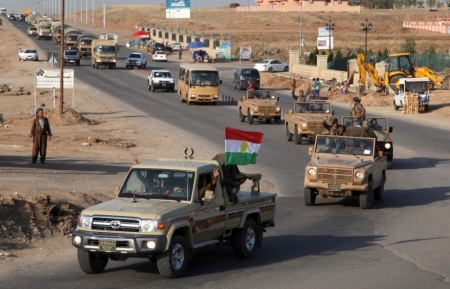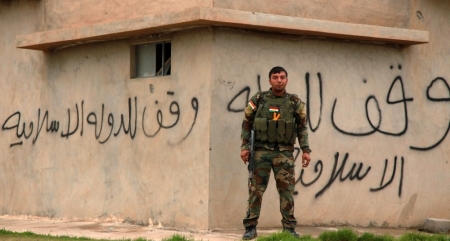Iraqi Kurd Fighters Take Sinjar Back From ISIS

Kurdish Peshmerga fighters have announced that they've taken the northern Iraqi town of Sinjar back from Islamic State militants in a battle months after tens of thousands of minority Yazidis had to flee their homes while others remained trapped after the town's capture by the terrorists.
The Kurd soldiers, backed by U.S.-led airstrikes, Saturday reached the flanks of Mount Sinjar, which was captured by ISIS early August, with food and other aid three days after they started a major offensive against terrorists, according to Press TV.
The fighters "succeeded in taking complete control of it and nearby villages," the Kurdistan Region Security Council said in a tweet about Sinjar.
Kurdish leader Massoud Barzani tweeted, saying, "Brave Peshmerga have broken the siege of Mount Sinjar. I dedicate this important victory to all Yazidis."
About 8,000 Peshmerga fighters were involved in the battle and they claimed to have killed at least 100 ISIS militants, according to The Daily Beast.

"It was a very big operation and thankfully it was concluded very successfully," Masrur Barzani, the son of the Iraqi Kurdish leader, was quoted as saying. "This operation will of course continue to clear all the areas that are still under the control of ISIS but the details of that, or the timing of that, I am not at liberty to discuss at the moment."
The expulsion from Sinjar might compel ISIS militants to now move into Mosul or nearby areas in Syria.
The day before the operation began, coalition aircraft conducted 48 airstrikes near Sinjar — the heaviest concentration of such airstrikes thus far, according to CNN.
As a result of the Kurdish victory, 32 truckloads of food, water and other needed aid began rolling out Saturday morning from Irbil, bound for Sinjar Mountain, the KRSC said.
U.S. officials said Friday that ISIS has been demoralized by losses it has suffered in Iraq and Syria due to ongoing American airstrikes.
"It [ISIS] was presenting itself as an unstoppable movement," The Guardian quoted an anonymous U.S. official as saying. "That kind of unstoppable momentum has been blunted, to say the least. We have killed over 1,000 of their fighters, particularly in Kobani [city in Syria], and that gets to Raqqa [also in Syria] because they wanted to take Kobani and had been making the biggest flag they had ever made and they were going to put it up there because to them this is a war of flags.
ISIS militants are "committed to this," and "we could see fighters flooding in from Raqqa and we saw that as an opportunity to attrite their manpower," the official added. "Fighters now don't want to go to Kobani. There are similar accounts in Mosul, people not getting paid what they thought they'd get paid, not living the life they thought they'd promised. … So the mood has changed."
ISIS, an al-Qaeda offshoot which seeks to form an Islamic emirate in the Levant region through "jihad," has gained control over large territories in Iraq and Syria.
In Iraq, ISIS men have killed hundreds of civilians. Numerous Christians and Yazidis have also been killed, and tens of thousands of them had to flee their homes. About 5,000 Yazidi girls and women were also recently taken captive by ISIS to be sold or given to fighters as slaves.





















